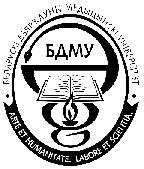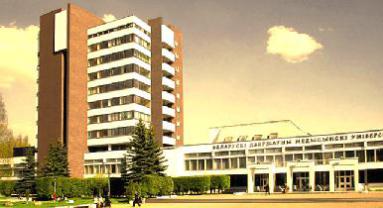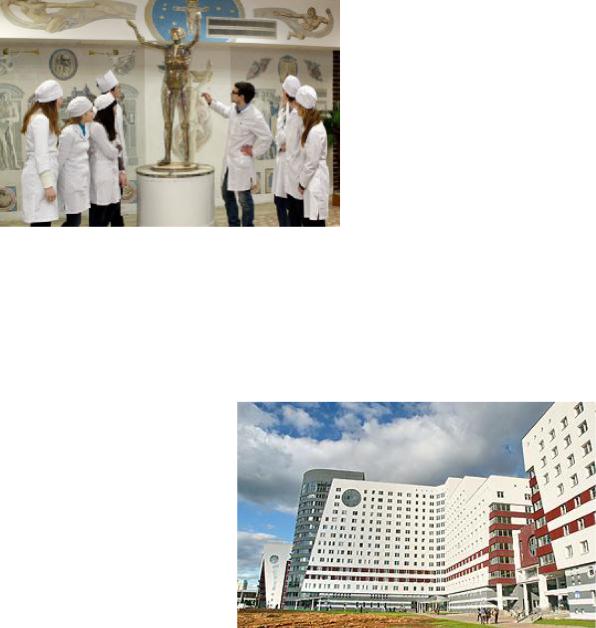
20140904121341nashiuniversitet
.pdf
МИНИСТЕРСТВО ЗДРАВООХРАНЕНИЯ РЕСПУБЛИКИ БЕЛАРУСЬ
БЕЛОРУССКИЙ ГОСУДАРСТВЕННЫЙ МЕДИЦИНСКИЙ УНИВЕРСИТЕТ
КАФЕДРА ИНОСТРАННЫХ ЯЗЫКОВ
М. Н. ПЕТРОВА, Т. А. ПРОВОЛОЦКАЯ
БЕЛОРУССКИЙ ГОСУДАРСТВЕННЫЙ МЕДИЦИНСКИЙ УНИВЕРСИТЕТ
Учебно-методическое пособие
Минск БГМУ 2014
УДК 61.(811.111)(091)(075.8) ББК 81.2 Англ-923
П30
Рекомендовано Научно-методическим советом университета в качестве учебно-методического пособия 30.10.2013 г., протокол № 2
Р е ц е н з е н т ы: ст. преп. Т. Г. Новицкая; преп. Г. В. Митерева
Петрова, М. Н.
П29 Белорусский государственный медицинский университет : учеб.-метод. посо- бие / М. Н. Петрова, Т. А. Проволоцкая. – Минск : БГМУ, 2014. – 35 с.
ISBN 978-985-528-953-2.
В издание включены тексты, рассказывающие о Белорусском государственном медицинском университете, о его истории, структуре, учебной программе, сегодняшнем дне университета, ме- ждународном сотрудничестве. Также представлены тексты о некоторых университетах Велико- британии и особенностях организации в них учебного процесса. Все тексты сопровождаются комплексом упражнений на закрепление языковых навыков и развитие речевых умений.
Предназначено для студентов 1-го курса, магистрантов и соискателей, изучающих англий- ский язык.
|
УДК 61.(811.111)(091)(075.8) |
|
ББК 81.2 Англ-923 |
ISBN 978-985-528-953-2 |
© Петрова М. Н., Проволоцкая Т. А., 2014 |
|
© УО «Белорусский государственный |
|
медицинский университет», 2014 |
2
ПРЕДИСЛОВИЕ
Учебно-методическое пособие «Белорусский государственный меди- цинский университет» рассчитано на 10 часов аудиторных занятий и под- готовку обучающихся к общению на английском языке по тематике, связанной с университетским медицинским образованием, путем взаимо- связанного обучения основным видам иноязычной речевой деятельности: говорения, аудирования, чтения и письма.
Формирование и развитие навыков и умений диалогической и моно- логической разговорной речи осуществляется на материале текстов (диа- логов)-образцов и комплекса разработанных к ним упражнений. При раз-
работке системы упражнений авторы руководствовались следующими методическими принципами: сознательности, разнообразия заданий, их коммуникативной направленности, последовательности, перехода от уп- ражнений репродуктивного типа к упражнениям продуктивного типа, стимулирующих речемыслительную деятельность учащихся.
Организация материала предусматривает последовательное форми-
рование и развитие речевых умений от первичных навыков употребления лексических единиц по теме и их грамматического оформления до ситуа- тивных заданий творческого характера, подготавливающих обучающихся к спонтанной диалогической и монологической речи.
Грамматический материал по теме представлен, в основном, в виде коротких правил и таблиц в грамматическом справочнике, расположен- ном в конце издания.
Активное использование усвоенного языкового материала, предло- женного в игровых ситуациях и дискуссиях, моделирующих речевое об- щение, в работе над заданиями для проектной деятельности будет способ- ствовать развитию творческого мышления обучающихся, навыков аргументации своего мнения, презентации новых идей.
3
PART I
VOCABULARY FOCUS
1. Memorize the vocabulary to Text 1:
1.institution [••nst••tju••ən] — учреждение
2.University [•ju•n••v••s•t•] — университет
3.to found (founded, founded) — основывать Syn.: to set up, to organize, to create
4.faculty ['fækəlt•] — факультет
the faculty of General ['d•enərəl] Medicine ['meds•n] — лечебный
факультет
the pediatric faculty — педиатрический факультет
the faculty of preventive medicine — медико-профилактический фа-
культет
the faculty of dentistry — стоматологический факультет
the faculty of military medicine — военно-медицинский факультет the pharmaceutical [•f••mə•sju•t•kəl] faculty — фармацевтиче-
ский факультет
the faculty of career guidance and pre-Univercity training — факультет
профориентации и довузовской подготовки
5.pharmaceutists [•f•:mə•sju•t•st] — провизор
6.postgraduate [pəust•grædjuit] — зд.: аспирант (также PhD student)
7.to train — готовить кого-либо
8.to enter the University — поступить в университет
9.to be admitted to the University — быть принятым в университет Syn.: to be enrolled — быть зачисленным
10.aim — цель
Syn. goal, purpose
11.to meet the requirements — удовлетворять (соответствовать) требо-
ваниям
12.current — современный
Syn.: contemporary, modern
13.to be committed to smth — быть преданным (приверженным) чему-
либо
14.to ensure [•n•••ə] — обеспечивать, гарантировать
15.to enhance [•n•h••ns] — укреплять, упрочивать
16.research [r••s••t•] — исследовательская работа
17.besides (in addition to) — кроме (в дополнение к чему-либо)
18.except — кроме (за исключением чего-либо)
19.to last — длиться, продолжаться
4
20.department — кафедра, отделение, отдел
21.associate [ə•sə••••t[ professor — доцент
22.to be in charge of smth — отвечать за что-либо
23.curriculum [kə•r•kj•ləm] — учебная программа
24.compulsory [kəm•p•lsər•] — обязательный
25.optional [••p•ənəl] — факультативный
26.to approve [ə•pru•v] — одобрять
27.to acquire [ə•kwa•ə] — приобретать
28.scholarship — стипендия
29.hostel (hall of residence) — общежитие hostel accommodation — жилье в общежитии
30.to attend lectures [•lеkt•əz] — посещать лекции
to take notes of the lectures — конспектировать лекции to deliver lectures — читать лекции
to miss lectures — пропускать лекции
31.to provide facilities — обеспечивать возможности, условия
32.to encourage — поощрять, поддерживать
33.student scientific [•sa•ən•t•f•k] society [sə•sa•ət•] — СНО
34.to enable — позволять, давать возможность
35.topical — актуальный
36.challenging — сложный
37.to contribute to smth — способствовать чему-либо, вносить вклад во что-либо
2. Practise the pronunciation: |
|
pediatrics [•pi:di'ætriks] |
anatomy [ə'nætəmi] |
cardiology [•ka:di'•ləd•i] |
gynaecology [•gaini'k•ləd•i] |
hygiene ['haid•i:n] |
obstetrics [•bs'tetriks] |
physiology [•fizi'•ləd•i] |
endocrinology |
|
[•endəukrai'n•ləd•i] |
psychiatry [sai'kaiətri] |
pharmacology [•fa:mə' k•ləd•i] |
surgery ['sə:dʒəri] |
epidemiology [•epi•di:mi'•ləd•i] |
genetics [d•i'netiks] |
|
3. Practise the stress:
hy'gienist, •epi•demi'ologist, •pedia'trician, •obste'trician, •thera'peutist, •pharma'ceutist, •gynae'cologist, •Uni'versity, •speci'ality, •speciali'zation, •scien'tific, •aca'demic, se'mester, la'boratory, a'ssociate pro'fessor.
4. Form new words and translate them:
1) the nouns by adding -er (or): to teach, to train, to instruct, to work, to read;
5
2)the adjectives by adding -al: dentistry, practice, region, clinic, option, medicine;
3)the adverbs by adding -ly: usual, different, special, main, scientific,
bad.
|
5. Read and translate the families of words. |
|
||||
|
Medicine, medical, |
medication; |
to educate, education, |
educational; |
||
to |
prepare, |
preparation, |
preparatory; |
sanitary, sanitation; to head, a head; |
||
to |
guide, a |
guide, guidance; |
to practise, practice, practical, |
practically; |
||
to choose, choice; skill, skilful, skilfully; experience, experienced. |
|
|||||
|
6. Remember the following prepositional phrases: |
|
||||
|
at the head of smth |
|
во главе чего-то |
|
||
|
to be divided into |
|
делиться на |
|
||
|
at the end of smth |
|
в конце чего-то |
|
||
|
examinations in smth |
экзамены по |
|
|||
|
to interfere with smth |
мешать чему-то |
|
|||
|
on one's own |
|
самостоятельно |
|
||
|
in the (first) year |
|
на (первом) курсе |
|
||
|
to work as a (doctor) |
|
работать в качестве (врача) |
|
||
|
to carry out (on) research |
проводить (выполнять) |
|
|||
|
|
|
|
научно-исследовательскую работу |
||
|
to be in charge of smth |
отвечать за что-то |
|
|||
|
to graduate from smth |
окончить (высшее учебное учреждение) |
||||
|
7. Read and translate the following word combinations: |
|
||||
educational |
institution, |
preventive medicine, to get valuable |
information, |
|||
to hold scientific conferences, tо give good opportunities, student scientific society, to attend lectures, to work on one's own, practical skills, to work as medical nurses, to get a scholarship, to provide facilities for sports activities, to complete the course of study.
8. Translate into English:
1.Учебный год делится на два семестра.
2.На первом курсе мы изучаем так называемые доклинические предметы.
3.В конце семестра мы будем сдавать экзамены по истории и химии.
4.Во главе факультета стоит декан, который отвечает за работу факультета.
5.Студенты университета много работают самостоятельно.
6.Студенческая научная конференция проводится в университете в апреле.
6
7. Когда вы окончите университет?
7
GRAMMAR PRACTICE
Simple tenses: Present Simple, Past Simple, Future Simple
1. Explain the use of tenses.
1.The course of study at the Faculty of Dentistry lasts 5 years.
2.We had to work hard to get ready for centralized tests.
3.In 3 years my brother will become a surgeon.
4.All my fellow students attended the lecture delivered by Professor Kuznetsov last week.
5.The students of our University spend much time working on their own.
6.In the sixth year students will gain experience in one of the main clinical subjects.
2. Read the following regular verbs in the Past Simple form:
entered, studied, acquired, attended, passed, delivered, worked, encouraged, provided, developed, enabled, ensured, asked, trained, helped, founded, committed, based, divided, lasted, included, devoted, advanced, expanded, applied, involved, joined, offered, exchanged, contributed, improved.
3. Use the proper tense forms.
1.We (to spend) two hours in the reading-room yesterday.
2.The recent conference (to enable) them to get valuable information.
3.Last April Department of Internal Diseases #3 (to hold) an international scientific conference on the topical problems of cardiology.
4.You (to become) a surgeon or a gynecologist after graduating from the University?
5.Participation in the Student Scientific Society (not to interfere) with the studies.
6.When we (to be) at school we (to work) hard at Chemistry and Biology.
7.What subjects (to study) the students in the first year?
4. Ask different types of questions to the following sentences.
1.The University enhances its position as a leading teaching and research institution (general).
2.The University ensures high quality medical education (special).
3.The course of study at the faculty of preventive medicine lasts 6 years (alternative).
4.He studied at the faculty of Career Guidance and pre-University training last year (disjunctive).
5.When the medical students complete their course of studies they will work as interns at a big regional or city hospital (special).
8

6. The studies in the third, fourth and fifth years are devoted to special medical subjects (special).
READING
1.What do you already know about BSMU?
2.Read Text 1 and say what new information about the University you have learnt.
TEXT 1
Belarusian State Medical University
Belarusian State Medical University is the leading higher medical education institution in the Republic of Belarus. It is the oldest and biggest medical University in the country. It was founded on the basis of the medical faculty of Belarusian State University in 1921.
Currently, |
about |
7000 students |
including |
postgraduates and clinical residents study at the Uni-
versity. |
The |
teaching |
|
process |
is |
organized at |
|
8 faculties: |
the faculties of |
||
General Medicine, Pediatrics, Preventive Medicine, Dentistry, Military Medi-
cine, Pharmacy, Career Guidance and Pre-University Training and the Medical Faculty for International Students. Physicians and surgeons are trained at the Faculty of General Medicine. The Faculty of Dentistry trains dentists. The Faculty of Preventive Medicine trains sanitary doctors, hygienists and epidemiologists. Future pharmaceutists study at the Pharmaceutical Faculty. Those who wish to improve their knowledge in Belarusian, Russian, Chemistry and Biology before entering the University can study at the Faculty of Career Guidance and Pre-University Training.
The main aim of the University is to provide the students with the knowledge and skills meeting the requirements of current practical medicine.
Therefore, the University is committed to the advancement of knowledge, ensuring high quality medical education and enhancing its position as a leading teaching and research institution.
The course of study is 6 years at all the faculties except the dental and pharmaceutical faculties where it lasts 5 years. The rector and vice-rectors are at the head of the University. Each faculty is headed by the dean. The head of
9

the department, usually a professor or associate professor, is in charge of the work of the department.
The teaching is based on the curriculum approved by the Ministry of Health and the Ministry of Education. The students can also choose 3 or 5 optional subjects besides the compulsory ones. The academic year is divided into 2 terms (semesters). Each term lasts 18–19 weeks. At the end of each term students take exams in several subjects.
In |
the |
first |
two |
years |
|
the students study the so-called |
|||||
“preclinical |
subjects” |
including |
|||
Anatomy, Chemistry, |
Biology, |
||||
Physics, Histology, Physiology, |
|||||
History, |
Latin, |
English |
etc. |
||
There are different forms of |
|||||
study. The students attend lec- |
|||||
tures, work in practical classes, |
|||||
spend much time in different la- |
|||||
boratories and the reading-room |
|||||
working on their own. |
|
|
|||
In the 3d, 4th, 5th and 6th years the studies are devoted to special medical subjects: Therapy, Surgery, Cardiology, Oncology, Gynaecology, Pharmacology, Neurology, Psychiatry, Hygiene, Genetics etc. Practical skills are very important for future doctors. Therefore, practical courses are taught at the best city hospitals and out-patient clinics where the most advanced teaching methods are applied. Besides, senior students acquire the necessary practical skills during practical training working as medical nurses and doctors' assistants.
The students who make good progress in their studies get scholarships. Most of the students live in the hostels (halls of residence). The University also provides facilities for social and sports activities and encourages the students to get involved in the cultural life giving lots of opportunities for all talents and abili-
ties. Joining a university club or society is a good way to get to know people quickly. Depending on their interests the students can join a sports club, a musical club, a drama club, a dance group or one of the many others that are offered. A wide variety of sports and recreational events are organized by the University.
10
